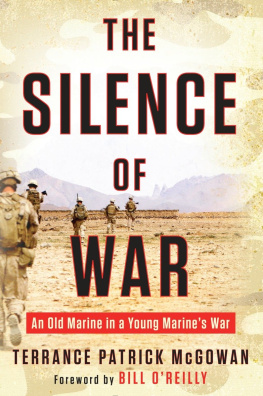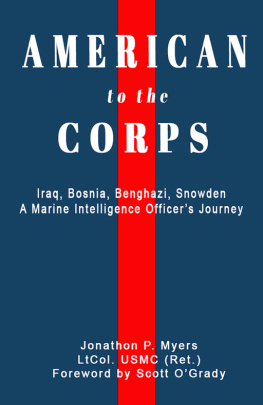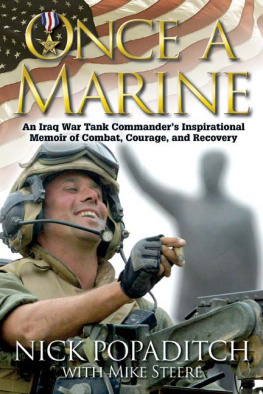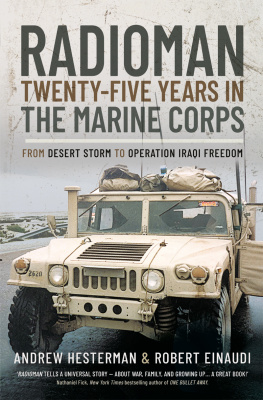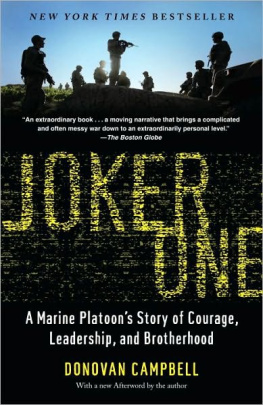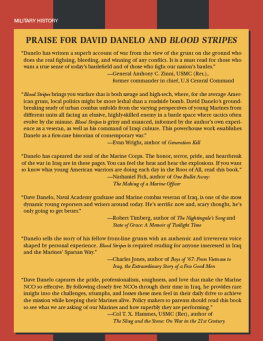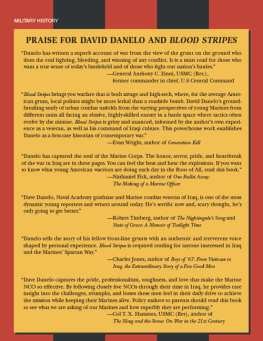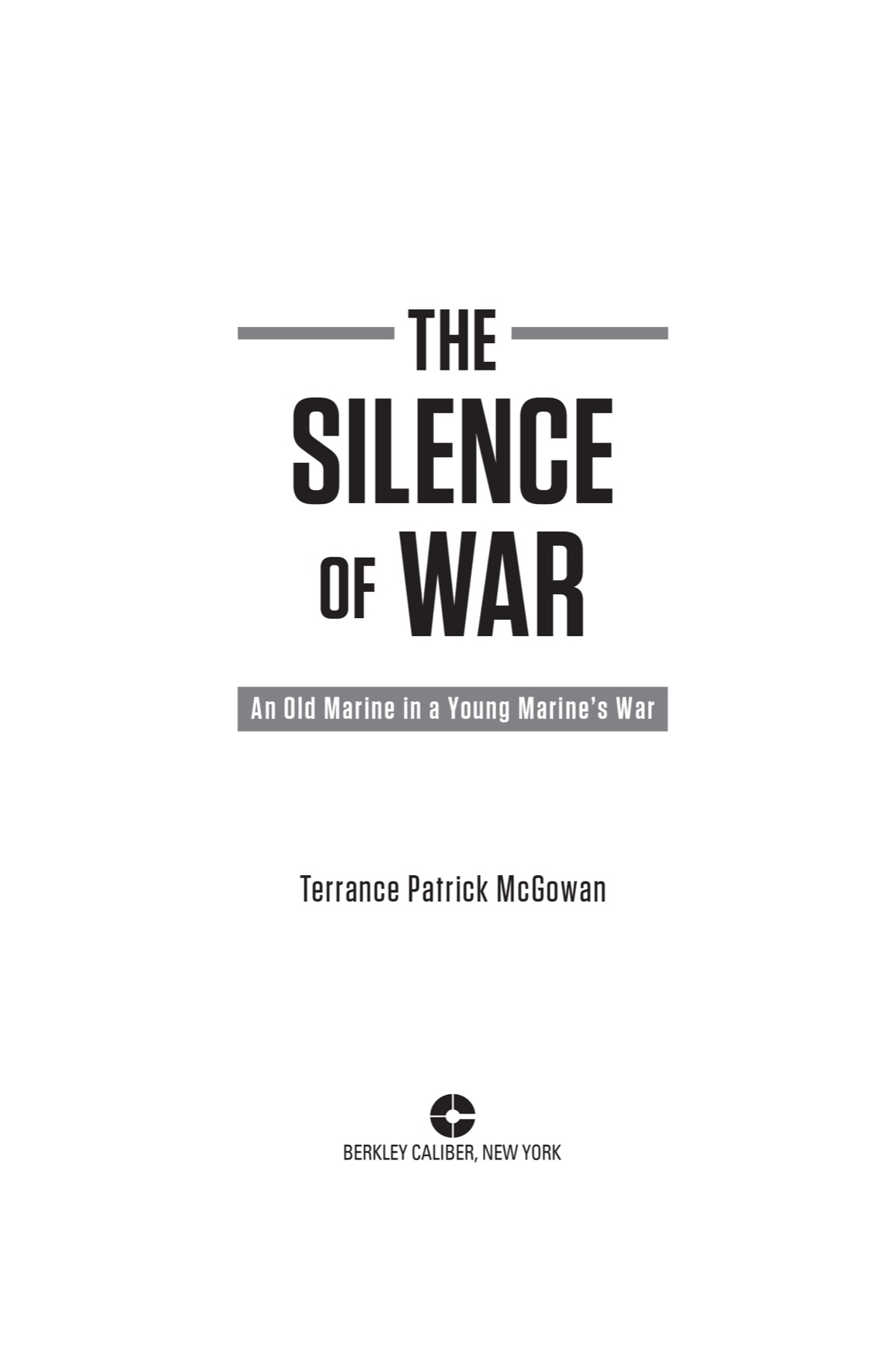Any views or opinions expressed in this book are those of the author, not of the FBI.

An imprint of Penguin Random House LLC
375 Hudson Street, New York, New York 10014
This book is an original publication of Penguin Random House LLC.
Copyright 2016 by Terrance Patrick McGowan
Foreword copyright 2016 by Bill OReilly
Penguin supports copyright. Copyright fuels creativity, encourages diverse voices, promotes free speech, and creates a vibrant culture. Thank you for buying an authorized edition of this book and for complying with copyright laws by not reproducing, scanning, or distributing any part of it in any form without permission. You are supporting writers and allowing Penguin to continue to publish books for every reader.
BERKLEY CALIBER and its colophon are trademarks of Penguin Random House LLC.
For more information, visit penguin.com.
Library of Congress Cataloging-in-Publication Data
Names: McGowan, Terrance Patrick, author.
Title: The silence of war: an old Marine in a young Marines war/Terrance
Patrick McGowan.
Other titles: Old Marine in a young Marines war
Description: New York : Berkley Caliber, [2016] | Forward Operating Base Delaram.
Identifiers: LCCN 2016016219 (print) | LCCN 2016017536 (ebook) | ISBN 9781101988183 | ISBN 9781101988206 (ebook)
Subjects: LCSH: McGowan, Terrance Patrick. | Afghan War, 2001Personal
narratives, American. | MarinesUnited StatesBiography. | Government
contractorsUnited StatesBiography. | United States. Marine Corps.
Marine Regiment, 7th. Battalion, 2ndBiography. | Afghan War,
2001CampaignsAfghanistanFarah (Province) | Baby boom
GenerationUnited StatesBiography. | Middle-aged menUnited
StatesBiography. | United States. Federal Bureau of
InvestigationOfficials and employeesBiography. | Iraq War,
20032011Personal narratives, American
Classification: LCC DS371.413.M37 2016 (print) | LCC DS371.413 (ebook) | DDC 958.104/742 [B]dc23
LC record available at https://lccn.loc.gov/2016016219
First edition: August 2016
Jacket design by Daniel Rembert.
Jacket photographs of U.S. Marine Corps by Lance Cpl. Brian D. Jones.
While the author has made every effort to provide accurate telephone numbers and Internet addresses at the time of publication, neither the author nor the publisher is responsible for errors, or for changes that occur after publication. Further, the publisher does not have any control over and does not assume any responsibility for author or third-party websites or their content.

Version_1
Contents
Foreword by Bill OReilly
Marine captain Terrance McGowan is a unique individual. A warrior in a country that is relatively safe, McGowan sought out adventure in places such as Iraq and Afghanistan in his late fifties. Maybe unique isnt the correct word. Perhaps crazy?
Most human beings have no idea about what really happens in a war zone. McGowan does, and his storytelling ability brings remote conflict into sharp focus for the reader. He puts you on the scene whether its a Taliban assault or a heartbreaking injury to a U.S. serviceperson overseas.
It was the fall of 1967 when I initially met Terry McGowan. He and I were freshmen at Marist College in Poughkeepsie, New York. The sons of working-class Irish parents, McGowan and I had something in common. But it soon became clear that I was the more conventional guy. McGowan consistently sought adventure. And if he couldnt find anyhe went to sleep. Boy, could that guy sleep!
The Silence of War is a personal book. Written from the vantage point of a former Marine, FBI agent, and local police officer, it offers life lessons that most of us have never had. McGowan is a no spin guy. He tells the truth about what he saw up close in dangerous areas.
It goes without saying that most Americans will never be tested in places such as Iraq and Afghanistan. But good citizens, who want to make educated decisions about policy and who want to vote responsibly, should understand the world we all inhabit. It also goes without saying that it took a man of courage to write The Silence of War.
Reading Terry McGowans book will help make all of us better citizens. I thank him for writing it.
Bill OReilly
New York City
October 2015
Preamble
I started sending emails to people back home in the States when I was still in Afghanistan. I was trying to tell them what it was likewhile we were all living itin real time. I got replies such as You made me cry, I felt like I was there, and You should write a book. Well, I decided to do just that.
In the midst of a bleak northeastern winter I sent my first draft to a fellow Marine whom I consider to be my kid brotherZach Wolfe. Zach lost his best friend over there. His name was Andrew Whit Whitacre. They were brothers from a different mother. Whit was killed in action on June 19, 2008. I dont need to look the date up. Whit was my friend too.
I had written about Whits death, of course, but I had barely touched on it. I care about Zach and I was trying to spare him the pain of reading about and reliving that terrible day. I now realize that was a mistake. People need to know the price theyre asking our fine young men to pay when they are sent off to warthe silent price.
Zachs response to me after reading the draft was emotionally commanding. He told me he had only made it halfway through before he started to cry. His very young daughterseeing her daddys distressclimbed up onto his lap and said, Thats okay, Daddy. You can have my teddy bear.
Zach told me I had to write the book. He wanted his family to know what he had been through. I knew Zach could never find the words. He knew it too.
When he and his wife had their next child, a boy, they named him Cooper Whitacre Wolfe. Whit had meant that much to Zach. He still does. Whit lives on in Zachs heart. And though the pain dims it is never fully extinguished.
The littlest Wolfe will have to grow up a bit before he learns about the Uncle Andrew he will never know. It will be at least a few years before he realizes why he has the middle name that he does. Possibly his dad will never be able to choke out the words that will enable him to understand. Possibly he will have to read this book somedayand in the process learn more about his dad as well.
Zach is blessed with a wonderful wife. I have no doubt that she understands him as well as anyone can. She will understand him even better after reading this book. So will the rest of Zachs family. Thats why he wanted it written. Thats why I had to write it. Zachs deepest scars cant be seen.
William Manchester in Goodbye, Darkness wrote a passage about the battle for Okinawa that stayed with me over the years since I first read the book. He wrote of how much he hated the war and wanted it to be over so he could go home. And how, when he was safe in an aid station being treated for wounds received in battle, he had to get out of the battlefield hospital and get back to his squad. They were more important to him than anything, including his own safety. By that time he wasnt fighting for his country, or world peace, or Mom or apple pie. He was fighting for the guys in his squad.

